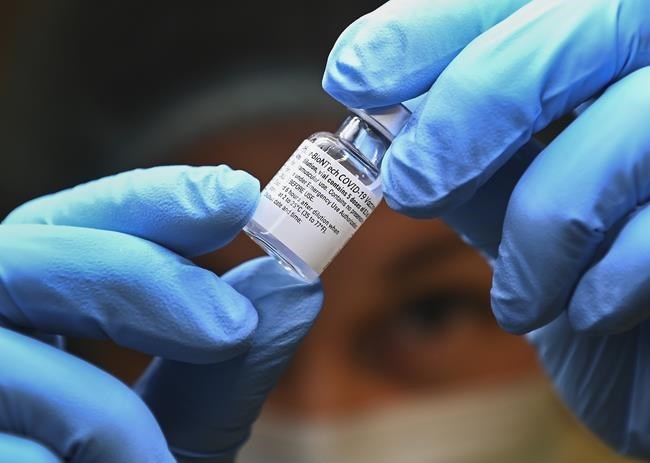OTTAWA — Prime Minister Justin Trudeau said he received further reassurance this week that Canada's expected supply of COVID-19 vaccines is secure.
Trudeau says he spoke Tuesday morning with European Commission President Ursula von der Leyen about Europe's vaccine export controls and Moderna chair Noubar Afeyan Monday about the company's Canadian contract.
He said von der Leyen reiterated that Europe won't stop Canada's shipments. She later tweeted that Canada is a "cherished friend" to Europe.
A spokeswoman for the European Commission told The Canadian Press last week that every request for vaccine exports has been granted so far, with 37 countries receiving them, including Canada.
Trudeau said Afeyan, whose company cut deliveries to Canada this month while it struggles to fully ramp up production in Europe, promised him the company will make good on the final 1.3 million doses of Moderna's vaccine to meet its contract to supply two million doses by the end of March.
Moderna has an earnings update for investors scheduled for Feb. 25 and is not expected to report any more details on its production situation until then.
Trudeau's Liberals are breathing an almost audible sigh of relief as deliveries of vaccines from Pfizer-BioNTech are restored following four weeks of slowdowns while a plant in Belgium was expanded.
"We are on schedule to receive our single largest Pfizer vaccine shipment to date and next week we are expecting an even larger shipment again," Trudeau said at a news conference on Parliament Hill Tuesday morning.
Pfizer is now scheduled to ship 3.1 million doses to Canada between this week and March 31.
The delayed deliveries from Pfizer and Moderna sent Canadian confidence in the vaccine rollout plummeting faster than the temperature in a polar vortex and Ottawa is bearing much of the blame.
The United Kingdom has now vaccinated almost one in four people, the United States about one in six, and Israel, which made a deal with Pfizer to supply data on how the vaccine is working in exchange for faster deliveries, has vaccinated almost four in five.
Canada has given at least a single dose to less than three per cent of the population.
Trudeau said he knows everyone will feel better "as we see doses coming into Canada, getting into people's arms" and repeated his now almost-daily promise that every Canadian who wants to be vaccinated will have that chance before the fall.
"We're going to get there," he said.
But chief public health officer Dr. Theresa Tam said new, more contagious variants of the virus that causes COVID-19 have likely moved the needle on how many Canadians have to get vaccinated if we're going to end the spread of the illness in Canada.
"You actually are much more likely to need a higher level of vaccine coverage than if you didn’t have such transmissible variants," she said.
Horacio Bach, an infectious-diseases professor at the University of British Columbia, said the new variants are also why we need a global vaccine response, not one in which rich countries like the United States, Canada and the United Kingdom hoard vaccines while poorer countries have to wait.
The SARS-CoV-2 virus that causes COVID-19 isn't mutating as quickly as an influenza virus does, for example, but it still does change a little every time it spreads from person to person. The more it spreads, the more it changes, and the more it changes, the more risk there is of new variants coming out that the vaccines won't be as good at protecting against.
"So you buy all the vaccines, nothing is going to poor countries and that's a big issue as well," said Bach. "Because these poor countries, no matter what, they will get the disease, and they will get the new variants and these variants will start to circulate again."
Last week South Africa stopped its rollout of the AstraZeneca vaccine after a small trial suggested the vaccine wasn't working well against the B.1.351 variant that is now dominant there.
Other vaccines have shown some effect against the variations to varying degrees.
Vaccine-makers are racing to adjust their formulas or make boosters against the variants. Bach said he expects there will eventually be a "cocktail" of COVID-19 vaccines needed to snuff out the pandemic once and for all.
Bach said inoculating with the current vaccines is helpful to slow the spread of the original virus and protect against it. In Canada the original virus is still dominant, though that could change rapidly, with some expecting Ontario's cases will be dominated by the B.1.1.7 variant in mere weeks.
This report by The Canadian Press was first published Feb. 16, 2021.
Mia Rabson, The Canadian Press



